- Applying to Uni
- Apprenticeships
- Health & Relationships
- Money & Finance
Personal Statements
- Postgraduate
- U.S Universities
University Interviews
- Vocational Qualifications
- Accommodation
- Budgeting, Money & Finance
- Health & Relationships
- Jobs & Careers
- Socialising
Studying Abroad
- Studying & Revision
- Technology
- University & College Admissions
Guide to GCSE Results Day
Finding a job after school or college
Retaking GCSEs

In this section
Choosing GCSE Subjects
Post-GCSE Options
GCSE Work Experience
GCSE Revision Tips
Why take an Apprenticeship?
Applying for an Apprenticeship
Apprenticeships Interviews
Apprenticeship Wage
Engineering Apprenticeships
What is an Apprenticeship?
Choosing an Apprenticeship
Real Life Apprentices
Degree Apprenticeships
Higher Apprenticeships
A Level Results Day 2024
AS Levels 2024
Clearing Guide 2024
Applying to University
SQA Results Day Guide 2024
BTEC Results Day Guide
Vocational Qualifications Guide
Sixth Form or College
International Baccalaureate
Post 18 options
Finding a Job
Should I take a Gap Year?
Travel Planning
Volunteering
Gap Year Guide
Gap Year Blogs
Applying to Oxbridge
Applying to US Universities
Choosing a Degree
Choosing a University or College
Personal Statement Editing and Review Service
Guide to Freshers' Week
Student Guides
Student Cooking
Student Blogs
- Top Rated Personal Statements
Personal Statement Examples
Writing Your Personal Statement
- Postgraduate Personal Statements
- International Student Personal Statements
- Gap Year Personal Statements
Personal Statement Length Checker
Personal Statement Examples By University
Personal Statement Changes 2025
- Personal Statement Template
Job Interviews
Types of Postgraduate Course
Writing a Postgraduate Personal Statement
Postgraduate Funding
Postgraduate Study
Internships
Choosing A College
Ivy League Universities
Common App Essay Examples
Universal College Application Guide
How To Write A College Admissions Essay
College Rankings
Admissions Tests
Fees & Funding
Scholarships
Budgeting For College
Online Degree
Platinum Express Editing and Review Service
Gold Editing and Review Service
Silver Express Editing and Review Service
UCAS Personal Statement Editing and Review Service
Oxbridge Personal Statement Editing and Review Service
Postgraduate Personal Statement Editing and Review Service
You are here
- Mature Student Personal Statements
- Personal Statements By University
- Accountancy and Finance Personal Statements
- Actuarial Science Personal Statements
- American Studies Personal Statements
- Anthropology Personal Statements
- Archaeology Personal Statements
- Architecture Personal Statements
- Art and Design Personal Statements
- Biochemistry Personal Statements
- Bioengineering Personal Statements
- Biology Personal Statements
- Biomedical Science Personal Statements
- Biotechnology Personal Statements
- Business Management Personal Statement Examples
- Business Personal Statements
- Catering and Food Personal Statements
- Chemistry Personal Statements
- Classics Personal Statements
- Computer Science Personal Statements
- Computing and IT Personal Statements
- Criminology Personal Statements
- Dance Personal Statements
- Dentistry Personal Statements
- Design Personal Statements
- Dietetics Personal Statements
- Drama Personal Statements
- Economics Personal Statement Examples
- Education Personal Statements
- Engineering Personal Statement Examples
- English Personal Statements
- Environment Personal Statements
- Environmental Science Personal Statements
- Event Management Personal Statements
- Fashion Personal Statements
- Film Personal Statements
- Finance Personal Statements
- Forensic Science Personal Statements
- Geography Personal Statements
- Geology Personal Statements
- Health Sciences Personal Statements
- History Personal Statements
- History of Art Personal Statements
- Hotel Management Personal Statements
- International Relations Personal Statements
- International Studies Personal Statements
- Islamic Studies Personal Statements
- Japanese Studies Personal Statements
- Journalism Personal Statements
- Land Economy Personal Statements
- Languages Personal Statements
- Law Personal Statement Examples
- Linguistics Personal Statements
- Management Personal Statements
- Marketing Personal Statements
- Mathematics Personal Statements
- Media Personal Statements
- Medicine Personal Statement Examples
- Midwifery Personal Statements
- Music Personal Statements
- Music Technology Personal Statements
- Natural Sciences Personal Statements
- Neuroscience Personal Statements
- Nursing Personal Statements
- Occupational Therapy Personal Statements
- Osteopathy Personal Statements
- Oxbridge Personal Statements
- Pharmacy Personal Statements
- Philosophy Personal Statements
- Photography Personal Statements
- Physics Personal Statements
- Physiology Personal Statements
- Physiotherapy Personal Statements
- Politics Personal Statements
- Psychology Personal Statement Examples
- Radiography Personal Statements
- Religious Studies Personal Statements
- Social Work Personal Statements
- Sociology Personal Statements
- Sports & Leisure Personal Statements
- Sports Science Personal Statements
- Surveying Personal Statements
- Teacher Training Personal Statements
- Theology Personal Statements
- Travel and Tourism Personal Statements
- Urban Planning Personal Statements
- Veterinary Science Personal Statements
- Zoology Personal Statements
- Personal Statement Editing Service
- Personal Statement Writing Guide
- Submit Your Personal Statement
- Personal Statement Questions 2025
- Personal Statement Changes 2024
Computer Science Personal Statement Examples
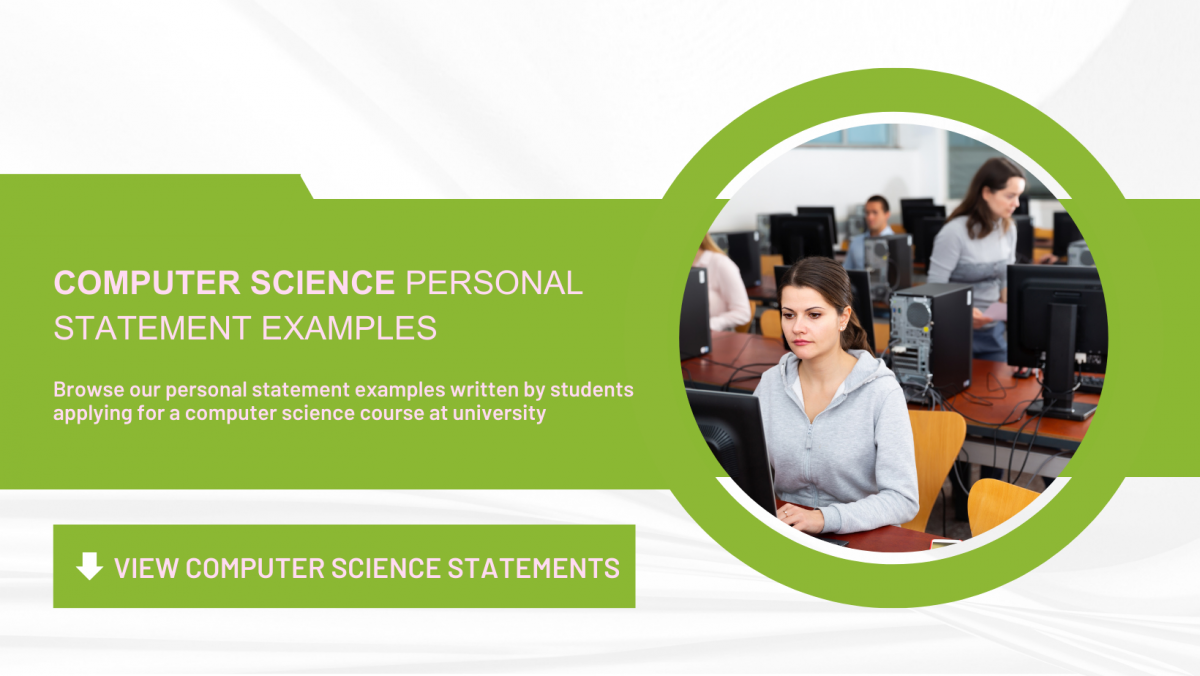
What is a computer science personal statement?
Your application form features your grades, but the UCAS personal statement is an opportunity to sell youself to the university.
This means you need to include your skills, goals and suitability for the course when drafting a computer science undergraduate or postgraduate personal statement.
Make sure you convey your talents for programming and why you are committed to this course. Read through some of our computer science personal statement examples to see what makes a good and successful statement.
How do I write a computer science personal statement?
When it comes down to how to start a personal statement, don’t tie yourself in knots. Why do you want to study computer science? Personal statements should answer this question, so open with your motivation during your introduction.
Your computer science personal statement should be easy to read, explaining why you have chosen this course and how you intend to work hard to achieve your goals. Give your computer science personal statemen to others to proofread, and ensure the language is concise, makes sense, and is grammatically correct. Don't just rely on a spellchecker for your final draft - read it through yourself, and check for errors thoroughly.
What should I include in my computer science personal statement?
- What subject areas do you enjoy that will support your application? For example, you might pick a topic from your mathematics A level that particularly interests and talk about why you find it fascinating.
- Remember that you can only write one personal statement, so it needs to be suitable for all the universities you are planning on applying to.
- Talk about your hobbies and extracurricular activities, and how they are relevant - what have you learned from them? Have they inspired you to do anything else? For example, have you built a computer from scratch, or built a new app or website? Are you able to code? If so, what languages can you code in and how did you learn?
- If you’re applying for a postgraduate course, you may want to talk about higher level skills you possess such as innovation, and the results of your final year undergraduate project.
- Think about your wider reading, e.g. newspapers, magazines, journals, etc. What recent developments interest you, and why are they exciting? Remember, your computer science personal statement needs to stand out from the crowd, so make it as relevant as possible, while giving it your own, unique voice.
How do I write my computer science personal statement introduction?
Try to start your computer science personal statement with a paragraph that will immediately grab the reader's attention. For example, you might relate a story about an experience with computer science when you were a child, such as a birthday present or a day trip with your family. You might also choose to open your statement by talking about one or two aspects of computer science that fascinate you, and why you find them interesting.
For example, this candidate talks about Linux and how they overcame the challenges of using this operating system:
"My views about computing changed considerably when I heard about Linux. In the late nineties it was a newer operating system and tasks like installing and configuring were considered to be quite challenging in India. However, I was intrigued by this challenge and without any formal training I was able to independently install this system. This was due to the sound knowledge I had acquired through reading a vast range of technical books. My fascination towards the evolving IT industry has been growing ever since. "
Not only does this pick out something specific from the world of computing, but shows the reader that the applicant had the persistence and ambition to figure out how to install and use the operating system using textbooks, which is the sort of student they are looking to engage on their course.
Another example is the following candidate, who chose to open their statement by recounting the time they built their first computer:
"Building my first computer was an experience I will never forget. Looking over what seemed to be a city of silicone, I marveled at how elegantly the components were arranged on the motherboard. Yet I did not feel fully satisfied, as I knew there was a whole other world of computing, which could only be explored by completing a degree in computer science.
Studying A Level mathematics has taught me that there are countless methods of approaching a problem and I have also found this to be true of programming."
Again, the student has picked out something specific and told a story, which helps to engage the reader straight away and tells them how interested they are in computing. They then go on to relate their current studies to the course, which is another strength of the opening of this statement.
Hopefully these two examples show how you might put together your own unique opening for your computer science statement, but if you're still struggling, take a look at the rest of our example personal statements .
How do I write a conclusion for my computer science personal statement?
We suggest rounding off your statement with a paragraph about your extracurricular activities and hobbies, and how they relate to your course. For example:
"I also participated at a first-aid national contest organized by the Red Cross Romania, which gave me the opportunity to be the leader of a rescue team. This helped me understand better how to face critical situations and improve my leadership skills.
I often think that computer science will give me the chance to reach higher peaks, and I really consider that it has already helped me see life in a different way. Programming gave me the chance to help many children with special needs, to meet interesting people, to discover a new world. That is exactly why I would like to study and follow a career in this field."
Further resources
For more help and advice on what to write in your computer science personal statement, please see:
- Personal Statement Editing Services
- Personal Statement Tips From A Teacher
- Analysis Of A Personal Statement
- The 15th January UCAS Deadline: 4 Ways To Avoid Missing It
- Personal Statement FAQs
- Personal Statement Timeline
- 10 Top Personal Statement Writing Tips
- What To Do If You Miss The 15th January UCAS Deadline.
Related resources
Replying to ucas offers.

Find out more
Choosing A Student Accommodation
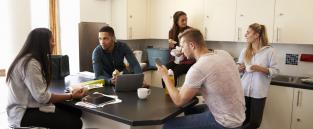
Best Student Discounts

6 Personal Statement Tips

A Level Results Day
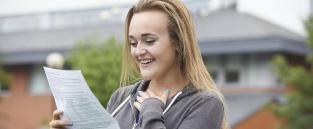
Clearing Guide

Computer Science Personal Statement (Guide + Examples!)

Applying to study computer science can be quite a complicated programs. There are so many programs out there with so many application requirements. But don’t worry, we’re here to help.
In this blog post, we’ll give you some tips on how to write a computer science personal statement that will increase your chances of getting accepted into the program of your choice.
Table of Contents
What Is a computer science personal statement?
A computer science personal statement is a document that you submit as part of your application to study computer science.
In this statement, you’ll need to talk about your motivation for wanting to study computer science, as well as your skills and experience . This is your chance to sell yourself to the admissions committee and demonstrate why you’re the perfect candidate for their program.
Anatomy of a personal statement
Now that we’ve covered what a computer science personal statement is, let’s take a look at what it should include.
1. Introduction
Your computer science personal statement should start with a brief introduction . In this section, you’ll want to introduce yourself as a computer science applicant and explain why you’re interested in studying computer science. This is your chance to grab the attention of the admissions committee and make them want to read on.
2. Your motivation for wanting to study computer science
In this section, you’ll need to explain your motivation for wanting to study computer science. What is it about computer science that interests you? What are your long-term career aspirations? This is your chance to sell yourself to the admissions committee and demonstrate your commitment to the subject.
3. Your skills and experience
In this section, you’ll need to talk about your skills and experience . What computer science-related courses have you taken? Do you have any industry experience? This is your chance to show the admissions committee that you have the skills and experience necessary to succeed in their program.
4. Conclusion
Your computer science personal statement should end with a brief conclusion . In this section, you’ll want to restate your motivation for wanting to study computer science and reiterate your commitment to the subject. This is your chance to leave a lasting impression on the admissions committee.

Who reads my computer science personal statement?
The computer science personal statement is read by the admissions committee of the computer science department to which you’re applying.
This committee is made up of professors and industry professionals who are experts in the field of computer science. They will use your personal statement to determine whether or not you’re a good fit for their program.
Usually, the admission review process includes several rounds, and your computer science personal statement will be read by multiple members of the admissions committee.
How long should my computer science personal statement be?
Your computer science personal statement should be between 500 and 1000 words . This is enough space for you to introduce yourself, talk about your motivation for wanting to study computer science, and discuss your skills and experience.
Speaking in pages, your computer science personal statement should be one to two pages long . If your personal statement is longer than that, the admissions committee is likely to skim it, or even worse, not read it at all.
What should I include in my computer science personal statement?
There are a few things you will want to include in your computer science personal statement. In general, you should provide the admissions committee with convincing motivation and evidence that will portray you as someone both passionate and promising as a future computer science student.
Some things that you may want to include in your computer science personal statement are:
- Source of motivation for studying computer science
- Evidence of programming or quantitative abilities
- Competitions/olympiads
- Relevant work experience
- Relevant projects
- Accomplishments
- Future career aspirations
Your personal statement may also include other information that you feel is important for the admissions committee to know about you. However, make sure that whatever you include is relevant to computer science and will help you stand out as a strong candidate.

What should I not write in my computer science personal statement?
There are a few things you’ll want to avoid including in your computer science personal statement. First, avoid repeating information that is already available in your application . The admissions committee will already have access to your transcripts, test scores, and resume, so there’s no need to include this information in your personal statement.
Second, avoid including information that is not relevant to computer science . The admissions committee is looking for evidence that you’re passionate about computer science and have the skills and experience necessary to succeed in their program, so including information about your hobbies or extracurricular activities may not be the best way to go forward.
An exception to this is if you’re including information about extenuating circumstances that have impacted your academic performance, in which case you should briefly explain how these circumstances have affected you and why you’re still a strong candidate for their program.
Finally, avoid using cliches, quotes, or formulas in your computer science personal statement . The admissions committee is looking for an original and authentic voice, so be sure to write in your own words.
Tips on writing a top-notch computer science personal statement
Now that we’ve gone over what to include and what not to include in your computer science personal statement, let’s talk about how you can write a top-notch personal statement.
First, start by brainstorming a list of your computer science-related experiences, skills, and accomplishments . This will give you a good starting point for your personal statement and help you determine what information is most relevant to include.
As you’re drafting your computer science personal statement, be sure to keep the following tips in mind:
- Write in clear, concise, and easy-to-understand language
- Use active voice
- Be honest and authentic
- Personalize your statement to the program you’re applying to
- Proofread your statement for grammar, spelling, and punctuation errors
By following these tips, you can write a computer science personal statement that is sure to impress the admissions committee and increase your chances of getting into your dream program.

Computer science personal statement examples
Now that we’ve covered the basics of what a computer science personal statement should include, let’s take a look at some computer science personal statement examples.
“I have been programming since I was 12 years old, and ever since then I have been fascinated by the possibilities that computer science offers. I am motivated by the idea of being able to create something from scratch and see it come to life, and I know that computer science will allow me to do just that. In addition, I have experience in working with code from different languages, which has taught me how to think critically and solve problems. My skills in critical thinking and problem solving are essential for studying computer science, as they will allow me to tackle complex challenges head-on.
Apart from my skills and experience, I am also passionate about learning new things. This is why during my free time I volunteered for Code for America, where I worked with a team of designers and developers to build a civic engagement platform. This experience showed me the importance of collaboration when it comes to creating something amazing, and it solidified my belief that teamwork is key to success.
Another project I got involved with was the development of a computer game for blind children. This project was important to me because it allowed me to use my skills for something good, and it also showed me how computer science can be used to create inclusive technologies.
Last year, I also had the opportunity to intern at Lyft, where I worked on a team that developed a new feature for the Lyft app. This experience was invaluable, as it gave me insights into the inner workings of one of the world’s most successful companies. It also showed me how computer science can be used to solve real-world problems.
Ultimately, I believe that I would be an excellent candidate for your computer science program because of my passion for the field combined with my skills and experience. I am confident that I have what it takes to succeed in computer science, and I hope to use my skills and knowledge to make a difference in the world.”
“I have always been interested in the way computers work and how they can be used to solve problems. This interest began when I was very young and has continued to grow as I have gotten older. My father is a computer scientist, so I have been exposed to computer science my entire life. In high school, I took several computer science courses and really enjoyed them. I also competed in several programming competitions and did well in them. In the following essay, I want to highlight my accomplishments as a computer science candidate and express my passion for this exciting field.
I am a computer science major at *NAME* University. I have taken several computer science courses and have gotten exceptional grades. My favorite course so far has been Introduction to Algorithms, for which I worked as a teaching assistant during my third year. I also competed in the Association for Computing Machinery International Collegiate Programming Contest, and our team placed in the top 100 out of 6,000 teams worldwide. This experience showed me that I have the ability to solve complex problems and work well under pressure.
As a student, I also worked as a part-time research assistant in the AI and Robotics laboratory, where I assisted in the development of a computer vision system for an autonomous robot. This experience allowed me to develop my skills in programming and computer science. In addition, I have also been a member of the Student Senate and have served on the Executive Board of the Student Government Association. These experiences have allowed me to develop leadership skills and learn how to work with others.
I am interested in computer science because it is a field that is constantly changing and evolving. There are always new problems to solve and new ways to solve them. I find this challenge exciting and invigorating. I am also interested in computer science because it is a field that combines creativity with logic. I enjoy using both my creative and logical sides when solving problems.
I am applying to your program specifically because I believe that it will allow me to further develop my skills in computer science. I am looking forward to taking classes from renowned professors and working with other talented students. I believe that your program will provide me with the skills and knowledge that I need to become a successful computer scientist.”
“Computers have always been a part of my life. As a toddler, I would watch my father work on computer programs for his business. Fascinated by the blinking cursor on the screen, I would ask him what he was doing and how it worked. My parents bought me my first computer when I was in grade school and I taught myself how to program in BASIC.
Since then, computer science has been my passion. I have pursued every opportunity to learn more about it, including taking computer science courses in high school and college and working as a research assistant for a computer science professor. I am excited to continue learning about computer science at the graduate level and to pursue a career in this field.
One of my biggest accomplishments in the field of computer science so far has been developing a computer program that can generate 3D models of human faces. This program has the potential to be used in a variety of applications, such as video game development, computer-aided design, and even law enforcement. I am currently working on submitting this program to a computer science conference for publication.
I have also been involved in a number of extracurricular activities related to computer science. I am a member of the Association for Computing Machinery and the Institute of Electrical and Electronics Engineers. I have also volunteered my time to teach computer science to elementary and middle school students through a local program called Girls Who Code.
Besides this, I have worked on several personal coding projects of my own. For example, I created a computer program that can solve Sudoku puzzles by using a technique called constraint satisfaction. I also developed a website for a local business called Joe’s pizzeria. My skills in computer science have also helped me in my other hobbies, such as photography and video editing. For the latter, I made a light correction tool that can automatically color-correct a video based on the primer of a still image.
I believe that my passion for computer science, as well as my experience in the field, makes me an ideal candidate for a graduate program in computer science. I am excited to continue learning and expanding my skills in computer science so that I can make an impact in this field. For this reason, I am excited to submit an early decision application to your computer science graduate program.”

What should I do after I have my first draft?
After you have completed the first draft of your computer science personal statement, you should follow these steps to edit, polish, and finalize your computer science personal statement:
1. Check the word count : Most programs will give you a word or a page limit for your computer science personal statement. Make sure you stay within that limit, as going over it can make you seem like you can’t follow instructions.
2. Proofread and edit it : This step is crucial. A well-written and error-free computer science personal statement will make you look more professional and competent. Use spell check and grammar check , and then have someone else proofread it for you.
3. Ask for feedback : Once you’ve proofread and edited your computer science personal statement, ask a few people for their feedback. Choose people whose opinions you trust and who will be honest with you.
4. Repeat steps 2 and 3 as needed : After you’ve received feedback, make the necessary changes to your computer science personal statement. Then, proofread and edit it again. Repeat this cycle until you’re happy with your statement.
5. Modify personal statement for each program : Don’t just submit the same computer science personal statement to every program you apply to. Tailor it to each individual program, highlighting why you’re a good fit for that specific school.
6. Submit : Once you’re happy with your computer science personal statement, submit it along with the rest of your application.
Make sure you give yourself enough time to do all of the steps above so that you can submit a strong statement. Remember, this is just one part of your overall application package, so make sure all other elements are strong as well—such as your grades, letters of recommendation , and resume.
We hope that this guide has been helpful and that you feel more confident in your ability to write a stellar computer science personal statement. Remember, the most important thing is to be yourself and let your passion for computer science shine through. As long as you are genuine and articulate your interest in the field, you are sure to impress admissions officers. Best of luck!

Elmar Mammadov is a software developer, tech startup founder, and computer science career specialist. He is the founder of CS Careerline and a true career changer who has previously pursued careers in medicine and neuroscience.
Due to his interest in programming and years of past personal experience in coding, he decided to break into the tech industry by attending a Master’s in Computer Science for career changers at University of Pennsylvania. Elmar passionately writes and coaches about breaking into the tech industry and computer science in general.
Share this:
- Click to email a link to a friend (Opens in new window)
- Click to share on Facebook (Opens in new window)
- Click to share on Twitter (Opens in new window)
- Click to share on LinkedIn (Opens in new window)
- Click to share on Reddit (Opens in new window)
- Click to share on Pinterest (Opens in new window)
- Click to share on WhatsApp (Opens in new window)

Writing the Perfect Computer Science Personal Statement
How to write a perfect computer science personal statement
Introduction.
Securing a place in a prestigious university computer science course can be highly competitive. If you are aiming for a Russell Group University or even an Oxbridge University, you need to know that they expect high standards. With numerous applicants vying for limited seats, it's crucial to present yourself as an exceptional candidate. One powerful tool at your disposal is the personal statement. This blog post will guide you through the process of crafting a winning personal statement, showcasing your passion for computer science, unique experiences, and future goals. By following these tried-and-tested techniques, you will be equipped to impress admissions committees, increase your chances of acceptance, and embark on an exciting academic journey.
1. Know Your Audience
Before diving into writing your personal statement, it's crucial to understand the expectations and values of the university admissions committee. Research the university's mission, vision, and curriculum to align your goals with theirs. Familiarize yourself with the specific requirements of the computer science program, highlighting key characteristics and skills they are seeking in applicants. This knowledge will enable you to tailor your personal statement to resonate with the selection panel and demonstrate your suitability for the course.
2. Reflect on Your Journey
To create a compelling personal statement, delve into your personal and academic experiences that have shaped your passion for computer science. Reflect on any challenges you have faced and how these have reinforced your determination. Highlight standout moments, such as participation in coding contests, internships, or research projects, that have nurtured your interest in the field. Articulate how these experiences have driven your decision to pursue a computer science course at the university.
3. Showcase Your Skills and Achievements
Highlighting your relevant skills and achievements is essential to demonstrate your competence and distinguish yourself from other applicants. Discuss your proficiency in programming languages, problem-solving abilities, and any noteworthy projects you have undertaken. Provide evidence of your skills using concrete examples, including software development projects, technical challenges overcome, or academic awards attained. By emphasizing your capabilities, you will exhibit your potential value to the computer science program.
4. Convey Your Passion
Universities seek individuals who are passionate about computer science and can contribute to the academic community. Communicate your enthusiasm by explaining how the subject captivates you, discussing influential readings or inspirational innovators. Illustrate how you have pursued your passion outside of formal education, such as attending conferences, participating in coding boot camps, or engaging in open-source projects. Conveying your fervor for the subject will demonstrate your dedication and drive for success.

5. Define Your Future Goals
Admissions committees are interested in candidates with clear vision and ambition. Outline your long-term objectives in the field of computer science, showing how the university's program aligns with your goals. Discuss your aspirations to contribute to cutting-edge technology, address industry-specific challenges, or make a positive societal impact through your work. Demonstrating your future plans will assure the admissions panel of your determination and long-term commitment, increasing your chances of acceptance.
6. Be Authentic and Engaging
While ensuring your personal statement meets academic and professional standards, it should also serve as a reflection of your authentic self. Use a conversational tone and inject your unique personality into your writing. However, strike a balance by maintaining professionalism and avoiding overly informal language. Engage the reader with captivating anecdotes, personal experiences, or thought-provoking ideas. By standing out from the crowd and captivating the admissions committee, you increase the chances of leaving a lasting impression.
Crafting a perfect personal statement for a university computer science course is a meticulous yet rewarding process. By understanding the expectations of the admissions committee, reflecting on your journey, and showcasing your achievements and skills, you can effectively highlight your strengths. Coupled with a genuine passion for computer science and clear future goals that align with the program's objectives, you set yourself apart from other applicants. Remember to remain authentic, engaging, and proofread meticulously to ensure your statement shines. Your well-crafted personal statement will undoubtedly make a compelling case for your acceptance, propelling you towards a successful future in the field of computer science.
See the list of DOs and DONTs when writing a computer science personal statement.
- Oxbridge Law 24/25 Entry
- Non-Oxbridge Law 24/25 Entry
- Oxford PPE 24/25 Entry
- Oxbridge Economics 24/25 Entry
- Oxbridge Modern Languages 24/25 Entry
- Cambridge Land Economy 24/25 Entry
- Oxbridge Psychology 24/25 Entry
- Oxbridge English 24/25 Entry
- Oxford Human Sciences 24/25 Entry
- Oxbridge History 24/25 Entry
- Oxbridge Geography 24/25 Entry
- Cambridge Philosophy 24/25 Entry
- Oxbridge Classics 24/25 Entry
- Cambridge Architecture 24/25 Entry
- Cambridge HSPS Programme 24/25 Entry
- Oxbridge Medicine 24/25 Entry
- Oxford Biomedical Sciences 24/25 Entry
- Oxbridge Engineering 24/25 Entry
- Cambridge Natural Science 24/25 Entry
- Oxbridge Maths 24/25 Entry
- Oxbridge Computer Science 24/25 Entry
- Oxford Physics 24/25 Entry
- Oxford PPL 24/25 Entry
- Cambridge Veterinary Science 24/25 Entry
- Oxford Chemistry 24/25 Entry
- Oxford Biology 24/25 Entry
- Oxford Biochemistry 24/25 Entry
- Non-Oxbridge Medicine 24/25 Entry
- Non-Oxbridge Dentistry 24/25 Entry
- IMAT Medicine 24/25 Entry
- Can’t Find Your Subject?
- Law Interview Programme
- PPE Interview Programme
- Economics Interview Programme
- Oxbridge Medicine Interview Programme
- Natural Science Interview Programme
- Engineering Interview Programme
- Maths Interview Programme
- Dentistry Interview Programme
- Medicine MMI Interview Programme
- Our Guarantee
Our Students
Student Success Stories
- University Access Scheme
- New Tutor Application Form
- Frequently Asked Questions
- How Does It Work?
Enrol before the 17th May and get 4 hours of A-Level tutoring. Book your consultation here.
Students who enrol on a Programme before the 17th May will get 4 hours of A-Level tutoring as a complimentary addition. Begin by booking your consultation here.
- +44 (0) 208 068 0438
- [email protected]

SCIENCE PROGRAMMES (25/26 ENTRY)
HUMANITIES PROGRAMMES (25/26 ENTRY)
GET STARTED
Can't find your subject?
OXFORD TESTS (25/26 ENTRY)
CAMBRIDGE TESTS (25/26 ENTRY)
MEDICINE TESTS (25/26 ENTRY)
View Our Free admissions guides & resources
How UniAdmissions Cracked The Oxbridge Formula
Applying for Oxbridge is an opportunity seldom approached correctly. So how do you enter the top 16% of a strong cohort of applicants that get an offer? Discover how UniAdmissions get 2/3 of our students in.
How To Stay Motivated During Your A-Level Exams
With A-level exam season in full swing, we've put together 6 useful tips and tricks to stay motivated and achieve those expected grades.
Inside The UniAdmissions Portal: The UA Advantage
UniAdmissions students have access to the world's first dedicated Oxbridge admissions preparation platform, and this guide will help you discover exactly how the Portal will help you get your offer.
Discover all guides
ABOUT UNIADMISSIONS
Learn about who the world's first Oxbridge prep school are.
Learn about the Portal; the heart of our Programmes.
UniAdmissions' Foundation
The Foundation is our charitable arm to support disadvantaged students.
Students & Tutors
Discover who a UniAdmissions student is and our admissions criteria.
Learn about our high-performing Oxbridge tutors.
We're proud of our alumni. Read about their journey with UniAdmissions here.
Admissions Resources
Free Admissions Guides
Visit our Learning Centre and read our in-depth free guides.
We are the world's biggest Oxbridge application publisher. Learn more here.
Teachers Learning Hub
Learn about how to help your students get their place at Oxbridge.
Get Started
- Access Student Portal
- Oxbridge Programmes
- Open Day Webinar
- Tutor Application Form
- Common Questions
- Download Our Prospectus
Successful Personal Statement Example For Computer Science At Oxford
Last Updated: 6th April 2022
Author: Rob Needleman
- Computer Science
Table of Contents
Welcome to our popular Personal Statement series where we present an example of a successful Personal Statement, and our Oxbridge Tutors provide their feedback on it.
Today, we are looking through a Computer Science applicant’s Personal Statement that helped secure a place at Oxford University. The Computer Science Course at Oxford is about understanding computer systems and networks at a deep level. Read on to see how this excellent Personal Statment gives attention to the mathematical side of Computer Science and showcases their achievements.
Here’s a breakdown of the Personal Statement (the applicant came very close to the 4,000 character limit):
SUCCESSFUL?
The universities this candidate applied to were the following:
LOUGHBOROUGH
Enrolling on our Oxbridge Computer Science comprehensive Programme will give you access to Personal Statement redrafts.
Your tutor will give you actionable feedback with insider tips on how to improve and make your Personal Statement Oxbridge quality for the best chances of success. Discover our Oxbridge Computer Science Premium Programme , enrol and triple your chances of success!
Example Computer Science Personal Statement
My first experiences with mathematics throughout school were always enjoyable but not inspiring. While I loved working with maths, and enjoyed representing our school in both the UKMT and Hans Woyda team competitions, I felt that maths could not be the end-in-itself the school syllabus presented it as. As I progressed through secondary education, however, I began to really see it as the powerful tool to understand and structure reality that it is.
The first time I saw that my interpretation of the use of maths had some substance was during a work experience placement I organised at IMSO (International Mobile Satellite Organization). There I encountered some examples of the mathematical and computing problems involved in working with satellites: from the difference between the Euclidean geometry on a map and the Elliptical geometry on a globe, to the logistics of moving satellites around to meet demand while keeping them in orbit. These were problems that demanded much more than mere number crunching, and being exposed to this gave me a taste of what maths beyond school might involve. A second work experience spell at Siemens provided me a much more in-depth view of the important role that communication systems play in keeping a company running efficiently and effectively.
My passion for mathematics and computing was further extended while reading ‘The Magical Maze’ by Ian Stewart. The description of maths as the exploration of a maze of our own creation had an incredibly profound effect on my understanding of what research in mathematics involves. What interested me especially was the visual part of resolving problems, so that they did not rely completely on resolving long calculations. This was close to how I like to understand and explain my ideas in mathematics.
Douglas Hofstadter’s ‘Gödel, Escher, Bach’ gave me a much deeper understanding of the axiomatic systems that make up maths and how parallels can be drawn between different subjects to gain a further understanding of them all. Connected by the theme of Gödel’s Incompleteness Theorem, the author passes through seemingly unrelated topics, such as the problem of consciousness and the mathematics of Zen principles, to explain the theorem. Although not the focus of the book, I have also enjoyed reading the links that are presented between maths and computing; it seems to me that maths is not just related to computing – computing is the physical manifestation of mathematics.
Maths and computing are about describing mental processes in a precise, logical way. The rigour required for mathematical proof leaves little room for subjectivity: something can be proven, disproven or unproven, but this depends completely on the validity of your logic. The idea of being able to extract order from apparent chaos, working through concepts until they click is what I love about these subjects, and what has attracted me to take those as an integral part of my further education.
However passionate I am about my academic studies, I also enjoy being involved in extracurricular activities. As head of mentoring and a prefect, I have improved my organizational abilities working with staff and mentors in developing study programmes for those students requiring extra help. Completing the Duke of Edinburgh bronze award – now working on the silver award – has allowed me to practice and develop my leadership and teamwork skills.
In my spare time I enjoy playing tennis, skiing and swimming; the latter I practice at competition level. I also love travelling, as having spent my childhood in Denmark, Egypt, United Kingdom and Spain has given me a hunger for mixing with different cultures. I like to unwind by playing the piano – I find that the pleasure one derives from making a piece your own is one that few activities can match.
I am thrilled about the prospect of further study in these subjects with some of the leading professors in the fields, and look forward to participating in university life.
Access "The Big Book Of Oxbridge Applications" For FREE
Your Personal Statement is only one step in your application, so discover everything you need to know in The Big Book Of Oxbridge Applications , available for free here! Through over 350 pages , you will find:
- 28 example Oxbridge Personal Statements
- Over 40 admissions test practice questions
- Interviews with Oxbridge students and graduates
- Additional downloadable resources
Fill in your details below to claim your digital copy today!
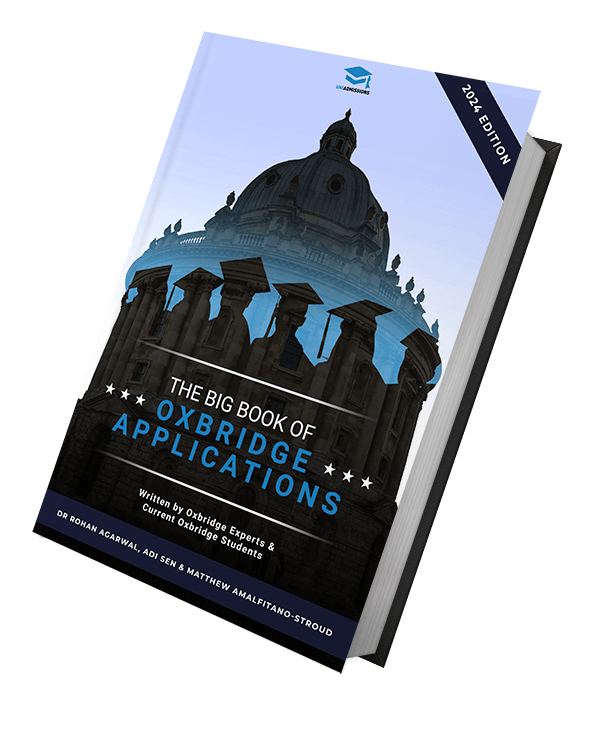
Good Points Of The Personal Statement
This is a well-written, structured statement. The student explains their reasons to pursue a dual-honours degree and gives equal attention to both disciplines to which they are applying. The student adds personality to the statement by thoroughly explaining their own views on all of the examples of literature read around maths and computing.
Bad Points Of The Personal Statement
There are quite a lot of short paragraphs. The student could have saved space by consolidating some paragraphs into one, hence shortening the statement. The student starts three paragraphs with ‘My’ or ‘In my’. This is quite repetitive. There are too many paragraphs, seven in total. Paragraphs five and six could be shortened and grouped into one paragraph. In the third paragraph, it appears as though the student has either forgotten to add an addition space (in order to start a new paragraph) or has incorrectly started a new line for the sentence ‘Douglas Hofstadter’s…’.
UniAdmissions Overall Score:
This is a very good statement. The student has clearly achieved a lot and writes in a clear and easy-to-understand way. Attention is given to both maths and computer sciences, which is essential as the student is applying for a dual honours course. With some restructuring, this could be an excellent statement.
This Personal Statement for Computer Science is a great example of how to tackle applying to two different degrees or dual honours. The candidate’s interest and achievements are clearly shown which is vital to Admissions Tutors.
Remember, at Oxford, these Admissions Tutors are often the people who will be teaching you for the next few years, so you need to appeal directly to them.
You can find more successful personal statements and our expert guides on our Free Personal Statement Resources page.
Successful Personal Statement For Natural Science (Physical) At Cambridge
Successful personal statement for economics at cambridge, successful personal statement for land economy at cambridge, successful personal statement for chemistry at oxford, successful personal statement for geography at oxford, successful personal statement for classics at oxford, successful personal statement for law at oxford, successful personal statement for classics at cambridge, successful personal statement for engineering at cambridge, successful personal statement for philosophy at cambridge, successful personal statement for veterinary medicine at cambridge, successful personal statement for psychological and behavioural sciences at cambridge, successful personal statement for psychology at oxford, successful personal statement for history at oxford, successful personal statement for physics at oxford, successful personal statement for cambridge mathematics and physics, successful personal statement for english at cambridge, successful personal statement for oxford english language and literature, successful personal statement for medicine at oxford university, successful personal statement for modern languages at oxford, successful personal statement for engineering at oxford, successful personal statement for natural sciences (biological) at cambridge, successful personal statement for economics & management at oxford, successful personal statement for ppe at oxford, successful personal statement for law at cambridge, successful personal statement for dentistry at king’s college london, successful personal statement for medicine at cambridge.
Our expert tutors are on hand to help you craft the perfect Personal Statement for your Oxford Computer Science application.
With our Oxbridge Computer Science Premium Programme, we help you craft the perfect Personal Statement , score highly on the MAT and teach you how to Interview effectively .
Discover our Oxbridge Computer Science Premium Programme by clicking the button below , learn about the programme, enrol and triple your chances of success.
UniAdmissions students placed at Oxford And Cambridge
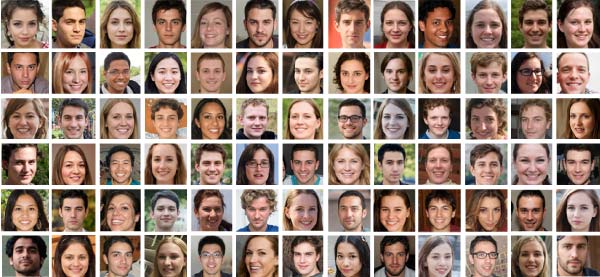
Continue learning about Oxbridge...

5 Study Secrets From Actual Oxbridge Students
We reached out to some successful Oxbridge students to find out exactly what their study secrets are. Here's what we…
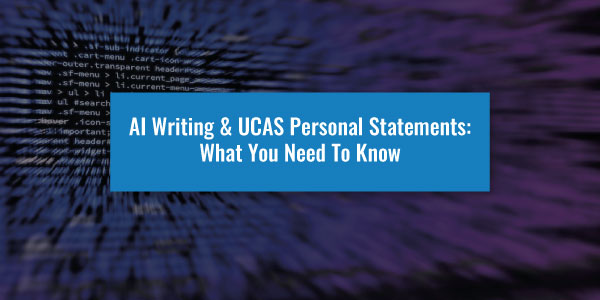
AI Writing & UCAS Personal Statements: What You Need To Know
When it comes to writing in the 2020s, AI-Generation has become one of the most important issues for many industries,…
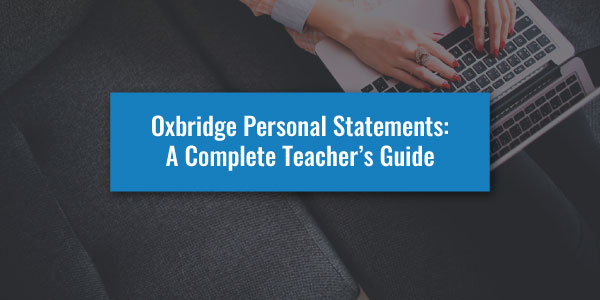
Oxbridge Personal Statements: A Complete Teacher’s Guide
As a teacher, you will support students with their UCAS Personal Statements every year, but what about Personal Statements for…
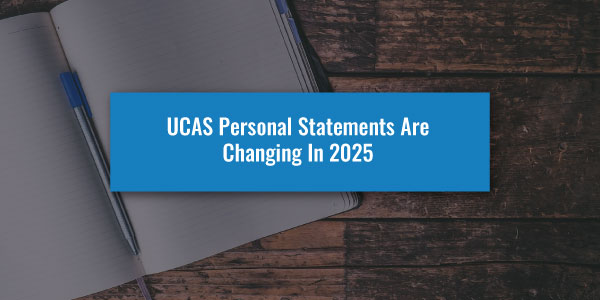
UCAS Personal Statements Are Changing in 2025
On January 12th 2023, UCAS announced that the traditional Personal Statement would be replaced by a multi-question form for university…

Writing an Economics and Management Personal Statement for Oxford? If so, you’re in the right place! In this post, we…
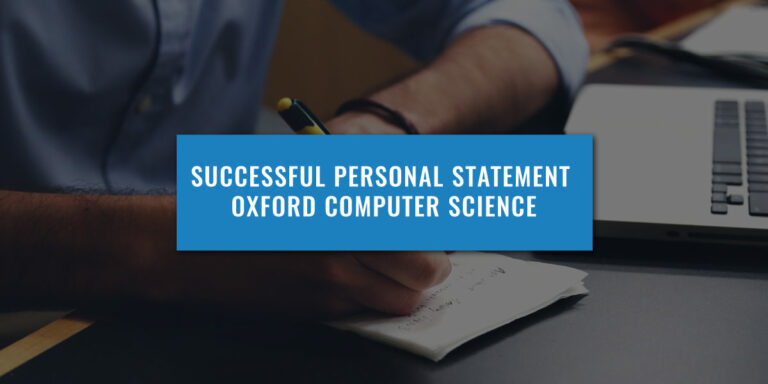
Successful Personal Statement For Computer Science At Oxford
Read through a successful Computer Science Personal Statement for Oxford with a full analysis by Oxbridge Tutors. Find out why…
The Secrets to Oxbridge Admission.
- We cracked the Oxbridge formula . Find out what we discovered here.
- Looking for application support? Don't work with a random tutor. This is what you need to know first.
- Get up-to-date Oxbridge advice with our webinars. Follow our Open Days led by our experts and stay updated.
- Begin your Oxbridge journey with UniAdmissions through our programmes of support by clicking here.
New Oxbridge Admissions Tests Explained!
How much do you know about the admissions tests changes for this application cycle? Join us this 1st of June at 2 pm and learn everything you need to know to prepare effectively with the new updates on the ESAT, TMUA & BMSAT .
How would you like to speak to an Admissions Consultant?

Personal Statement Examples for Graduate School: Computer Science

Crafting a Standout Computer Science Personal Statement
Crafting a compelling personal statement is crucial for graduate school acceptance. Successful statements showcase your academic and professional accomplishments. They also put a spotlight on your personality, goals, and motivations. When you master this process can make your application stand out and secure your place in graduate school. That’s where our expertise comes into play. Our expertise is here to guide you through the graduate application complexities, providing insights, guidance, and feedback to enhance your writing and engage admissions committees.
Successful Personal Statement Examples for Graduate School
In this post, we’re excited to open our collection of personal statement examples for graduate school. We’re sharing two that students just like you used to get into graduate Computer Science programs:

Both essays, while strong in their current form, nevertheless offer learning opportunities on how further refinement can enhance clarity, coherence, and impact. Our commentary on these pieces provides actionable advice on how to approach revisions, ensuring that each paragraph serves a clear purpose and contributes to the overall narrative effectively.
Explore our graduate school personal statement examples and feedback to grasp the detailed analysis and attention that perfects a statement. Whether starting your draft or finalizing revisions, our insights will help you showcase your strengths, improve weaknesses, and express your future vision.
Finally, remember that a great personal statement does not just happen—it is crafted. Let us guide you through this process, offering the expertise and feedback necessary to turn a good personal statement into an outstanding one. Explore our blog for more tips, examples , and professional guidance on making your graduate application journey a success.

View all posts
More from Magoosh

Leave a Comment
Please leave any questions or suggestions in the comments, we try our best to respond within a few days! Your email address will not be published.
Leave a Reply Cancel reply
Your email address will not be published. Required fields are marked *
- Log in
- Site search
Computer science personal statement
If you studied an unrelated undergraduate degree but have mathematical and analytical ability then you could consider an MSc in computer science
When writing a personal statement for a postgraduate course that differs from your undergraduate degree, you should:
- Make a strong case for why you are pursuing study in a different subject area, outlining how your previous academic experience has prepared you to switch disciplines.
- Consider the transferable and related skills which link your previous and future study.
- Highlight prior learning and experiences relevant to the course you are looking to study. This could include employment, volunteering, extra-curricular activities, completing online courses, attending events and conferences.
- Mention any further activities you will do before starting the course to fill any gaps in your knowledge.
- Show you have an in-depth understanding of the subject area, including the knowledge and experience you hope to gain and how this fits in with your career aspirations.
- Demonstrate that you have researched the programme and institution thoroughly. Highlight specific modules, practical elements, university facilities and unique aspects of the programme which attract you. Explain how the course aligns with your academic and career objectives.
This example should be used for guidance only. Copying any of this text could significantly harm your chances of securing a place on a course.
Computer science personal statement example
Despite obtaining my undergraduate degree in social science, I have developed a passion for technology and a strong interest in the world of computer science through my academic endeavours, extra-curricular activities, and part-time job.
My journey into the realm of technology began during my undergraduate studies, where I quickly discovered the analytical and problem-solving skills inherent in computer science were the very skills I was drawn to in the field of social science.
During the first and second year of my degree, I studied optional introductory modules in 'Computing Science' and 'Data Science', which sparked my passion for technology.
Thereafter, I sought opportunities to integrate computing techniques and mathematical approaches into my projects, demonstrating my commitment to acquiring the foundational knowledge needed for a successful transition to computer science.
As such, my dissertation explored 'Data-Driven Approaches to Social Policy Evaluation', investigating how algorithms can be used to analyse large datasets and measure the impact of social policies on various outcomes, including poverty rates.
Aside from my studies, I have used my extra-curricular activities to enjoy the practical applications of computer science. As a member of an ethical hacking society, I participated in hackathons, coding competitions, and collaborative projects.
The experience was transformative, allowing me the opportunity to apply theoretical concepts to real-world scenarios and nurturing my problem-solving skills. Joining the society complemented my part-time role during university as an IT assistant, where I witnessed first-hand the necessity for IT systems and networks to work effectively to achieve business needs.
These experiences across education and employment have motivated me to study an MSc in computer science, where I can delve deeper into a number of areas including programming languages, systems development, network security and algorithms.
The prospect of completing an independent project as part of the programme energises me to further enhance my practical abilities and contribute to overcoming complex challenges in the ever-evolving landscape of technology.
I am choosing to study the MSc Computer Science at X University due to the university's long-established international expertise in delivering computer science programmes, which is demonstrated in its recognition for research activities, particularly in the area of cyber security.
Due to this reputation, I believe X University to be the standout institution for me to advance my academic studies, as the department's ability to produce highly skilled and in-demand cyber security graduates matches my ambition in becoming a cyber security analyst.
Furthermore, I'm aware graduates of the programme at X University have transitioned to careers as applications developers, another career path I am keen to explore. The programme's engagement with leading organisations in the industry and the state-of-the-art learning facilities available to students has cemented my commitment to studying here.
Achieving an undergraduate degree in social science to now pursuing an MSc in computer science demonstrates my adaptability, resilience and commitment to personal and professional growth.
To prepare for this switch in discipline, I have engaged in self-directed learning by undertaking online courses in programming, data analytics and web development. This will ensure that I am well-equipped to tackle the exciting challenges that studying an MSc in computer science entails.
I am confident that studying at X University will provide me with an unrivalled experience, enabling me to progress to a fulfilling career in the field of computer science.
Find out more
- Search for postgraduate courses in computer science .
- Learn more about personal statements for postgraduate applications .
- Discover more about applying for a Masters .
How would you rate this page?
On a scale where 1 is dislike and 5 is like
- Dislike 1 unhappy-very
- Like 5 happy-very
Thank you for rating the page
- Computer Science
- Undergraduate Program
Introduction to the Major
The Computer Science major (CS) deals with computer theory, methods of information processing, hardware and software design, and applications. The major combines a rigorous technical program with background in the liberal arts and sciences. The CS major prepares students for technical careers or graduate school programs related to EECS or CS.
All students admitted to the College of Letters & Science are admitted as undeclared students. To declare CS, students must achieve a cumulative grade point average of 3.30 in CS61A, CS61B, & CS70. All students who meet this criteria are admitted into the major.
One Department, Two Programs
There is no difference in the CS course content between the CS and EECS majors--the differences are what other subjects you'd like to study and the admissions processes to the university and majors.
If you prefer greater flexibility in your coursework, or have an interest double-majoring in an area outside engineering, the CS major might be a good choice. There is greater opportunity to explore other departments, like economics, business, and music.
If you have a great interest in electrical engineering or in double-majoring in another engineering major, the EECS major may be better suited for you.
Related Majors
There are many ways to get exposure to CS other than via the CS major. The following majors are avenues to study CS and to help prepare students for industry and graduate school: applied math, cognitive science, data science, & statistics.
The CS minor is also a great option that equips students for industry and graduate school.
CS isn’t something I could’ve done alone, so I’m grateful for the community here. Steven Tan, CS student and CS Peer Advisor
- Four-Year Student Timeline
Explore Your Major
- See CS requirements & declaration policies
- Take CS10 and/or CS8 before CS61A, if no coding experience.
- See math requirements & AP/IB policies . Find calculus starting point .
- Check in with a CS major advisor .
Connect and Build Community
- New to CS? Apply for the CS Scholars Program
- Get support in classes from resources and counselors
- Become familiar with Disabled Students’ Program , Gender Equity Resource Center , Undocumented Student Program , Educational Opportunity Program .
Discover Your Passions
- Enroll in a Freshman & Sophomore Seminar . Look for CS/EE 24 & 39.
- Visit the Office of Undergraduate Research and Scholarships to learn about research opportunities.
- Take a DeCal , a student-facilitated course.
Engage Locally and Globally
- Explore study abroad options now so you can incorporate them into your sophomore or junior year plans.
- Explore volunteer opportunities on campus.
Reflect and Plan Your Future
- Develop a plan for getting career ready.
- Join Handshake for Berkeley-specific career opportunities.
- Learn about career opportunities in CS at Berkeley Career Engagement .
- Look for internship programs at various companies specific to first-year students.
Second Year
- Complete the CS prerequisite coursework to declare your major. Recommended: Apply to CS by the end of your 2nd year.
- Use the EECS website to help guide your B.A. program, and the HKN course guide to think about future classes in CS/EE.
- Consider a minor .
- Learn about EECS student organizations
- Consider becoming an Academic Intern, Reader, or Tutor for a lower-division CS/EE class.
- Seek CS Peer Advising and ask questions on the EECS 101 on Edstem
- Go to office hours of professors and GSIs.
- Assist a professor in their research through the Undergraduate Research Apprenticeship Program
- Attend the EECS Department Colloquium Series to learn more about the field.
- Learn more about research opportunities available at UC Berkeley.
- Explore study abroad options for CS and meet with both a CS major advisor and your L&S advisor to confirm requirement fulfillment.
- Join Bridging Berkeley to become a math mentor to middle schoolers.
- Subscribe to the eecs-ugrad-jobs list-serv to learn about CS Info-sessions and Tech Talks
- Attend the EECS Internship Fair , EECS & STEM Career Fairs
- Meet with Berkeley Career Engagement or UPE for resume help and interview practice.
- Complete CS lower-division requirements ; begin taking upper-division courses
- Check-in with a CS major advisor
- Participate in faculty advising each semester once declared.
- If eligible and interested in research, consider the EECS Honors Program .
- Enjoy teaching and/or mentoring? Become an EE/CS DeCal facilitator or CS Mentor . Learn about how to become an Undergraduate Student Instructor in future semesters.
- Consider applying to the Accel Scholars Program .
- Explore Beehive and other EECS research opportunities for undergraduates.
- Learn about upper-division technical electives for your major outside CS.
- Join CalTeach to gain teaching skills and explore a career in education.
- Interested in community outreach? Check out the opportunities available in community outreach programs for engineering students.
- Get matched with a graduate student mentor through Berkeley Connect .
- Attend the Engineering and Tech Career Conference to prepare for recruiting season.
- Utilize job board tools in your job search.
- Explore graduate school options by speaking with faculty members and advisors .
Fourth Year
- Complete remaining CS upper-division requirements
- Consider getting faculty permission to take CS graduate courses.
- Meet with a CS advisor to ensure CS requirements will be completed.
- Check-in with an L&S advisor to stay on track to graduate.
- Give back by becoming a CS peer advisor or tutor at the Student Learning Center .
- Volunteer for EECS Departmental events like CS Education Day and Cal Day .
- See ways to stay in touch with the EECS Department after you graduate.
- Carry out your own research project funded by scholarships
- Attend events at the Sutardja Center for Entrepreneurship & Technology or the Jacobs Institute for Design and Innovation .
- Consider researching and applying for scholarships available to recent Berkeley graduates.
- If interested in graduate school, explore gap year opportunities prior to embarking on your next academic or career adventure.
- Continue to attend industry-related events.
- Take the GRE & seek letters of recommendation if interested in graduate school.
- View the First Destination Survey to find out what recent grads are doing.
What Can I Do With My Major?
Jobs and employers.
- Analyst, Axioma
- Application Developer, Workday
- ASIC Engineer, Nvidia
- Assoc. Publishing Producer, Google
- Care Coordinator, YoDerm
- Consultant, Bain and Company
- Cyber Security Consultant, Deloitte
- Data Analyst, Apple
- Data Scientist, Nerdwallet
- Front End Developer, HealthTap
- Hardware Engineer, Apple
- Infrastructure Engineer, Capital One
- Investment Engineer, Bridgewater
- iOS Engineer, Mozilla
- Machine Learning Engineer, eBay
- Mobile Developer, Sony
- Performance Engineer, Splunk
- Program Manager, Microsoft
- Programmer, Intl CS Institute
- R&D Engineer, Glint Photonics
- Site Reliability Engineer, Google
- Software Developer, Expedia
- Software Engineer, AirBnB
- Surface Warfare Officer, U.S. Navy
- Systems Specialist, Salesforce
- Teacher, Teach for India
- Technology Analyst, Goldman Sachs
- UX Designer, GoDaddy
Graduate Programs
- Algebra & Numbers Theory
- Artificial Intelligence & Robotics
- Audiology & Hearing Sciences
- Biological Sciences
- Biostatistics
- Computational Mathematics
- Computer Engineering
- Computer Graphics
- Electrical Engineering
- Industrial & Org. Psychology
- Interdisciplinary Studies
- Physical Chemistry
Examples from the First Destination Survey of recent Berkeley graduates.
Connect With Us
Come to Berkeley’s annual Open House in April for information sessions, campus tours, special talks, and more. See what events the EECS Department offers at eecs.berkeley.edu/academics/undergraduate/calday .
Golden Bear Orientation
Join your peers in the campus-wide UC Berkeley orientation program for all new students.
Attend department events with students, staff, and faculty. Visit eecs.berkeley.edu for news and updates.
Prospective students can make an appointment to meet with a CS advisor at berkeleycs.youcanbook.me . Current students should make a CS advising appointment through CalCentral.
Drop-in CS advising is available. Please check eecs.berkeley.edu/resources/undergrads/cs/advising for the latest schedule.
Letters & Science College advising services can be found at lsadvising.berkeley.edu
How to Use this Map
Use this map to help plan and guide your experience at UC Berkeley, including academic, co-curricular, and discovery opportunities. Everyone’s Berkeley experience is different and activities in this map are suggestions. Always consult with your advisors whenever possible for new opportunities and updates.
- What Can I Do with My Major?

Download the PDF Print Version

The Department Office is located on the 5th Floor of the Student and Faculty Support (SF) building, Room 570.
Hours open: 8:00 a.m. to 5:00 p.m., monday through friday., dept. phone: (510) 885-4300, professor emeritus.
C. Matthew Johnson, Ph.D. College of William and Mary
Kevin A. Brown, Ph.D. University of South Carolina
Leann Christianson, Ph.D. University of South Carolina
Levent Ertaul (Chair), Ph.D. University of Sussex (United Kingdom)
Lynne L. Grewe, Ph.D. Purdue University
Farzan Roohparvar, Ph.D. Iowa State University
Associate Professors
Moayed Daneshyari, Ph.D. Oklahoma State University
Zahra Derakhshandeh, Ph.D. Arizona State University
Varick Erickson, Ph.D. University of California, Merced
Xiaojun Ruan, Ph.D. Auburn University
David Yang, Ph.D. Columbia University
Jiaofei Zhong, Ph.D. The University of Texas at Dallas
Assistant Professors
Tiantian Chen, Ph.D. University of Texas at Dallas
Hongmin Li, Ph.D., Kansas State University
Xiantian Zhou, Ph.D. The University of Houston
Undergraduate Coordinator: Varick Erickson
Graduate Coordinator: Leann Christianson
Internship Coordinator: Lynne Grewe
Department Statement
With its diverse and experienced full-time faculty, the Computer Science Department has become a thriving hub of education, offering an extensive range of courses across various modes of delivery and schedules. The department offers Bachelor’s and Master’s degrees in computer science and also offers a minor in the same discipline, catering to a diverse student community. As one of the largest majors on campus, the department is committed to delivering quality education to its students.
About the Department
Use our university website link to learn more about what the Computer Science Department has to offer.
- Awards & Scholarships
- PhD Graduate School Information
- Computer Science Professional Societies
- Advising & Student Services
- And more…
- Computer Science, B.S.
- Computer Science Minor
- Computer Science, M.S.: Computer Networks Concentration
- Computer Science, M.S.: Computer Science Concentration
- CS 100 - Programming for Everyone
- CS 100A - Programming for Everyone Workshop
- CS 101 - Computer Science I
- CS 170 - Cyber Security Awareness for Everybody: How to protect yourself in Cyber Space
- CS 180 - Computers in Action
- CS 200 - Advanced Programming for Everyone
- CS 201 - Computer Science II
- CS 211 - Discrete Structures
- CS 221 - Computer Organization and Assembly Language
- CS 230 - Computing and Social Responsibility
- CS 300 - Data Structures for Everyone
- CS 301 - Data Structures and Algorithms
- CS 311 - Programming Language Concepts
- CS 321 - Computer Architecture
- CS 351 - Website Development
- CS 370 - Databases for Social and Health Sciences
- CS 398 - Internship
- CS 400 - Computer Programming for Science
- CS 401 - Software Engineering
- CS 411 - Automata and Computation
- CS 413 - Analysis of Algorithms
- CS 421 - Operating Systems
- CS 431 - Database Architecture
- CS 441 - Computer Networks
- CS 453 - Mobile Programming
- CS 455 - Computer Graphics
- CS 461 - Artificial Intelligence
- CS 467 - Introduction to Machine Learning
- CS 468 - Introduction to Natural Language Processing with Deep Learning
- CS 471 - Security and Information Assurance
- CS 490 - Independent Study
- CS 497 - Topics in Computer Science
- CS 498 - Internship
- CS 601 - Advanced Algorithms
- CS 603 - Advanced Software Engineering
- CS 607 - Parallel Computing
- CS 611 - Theory of Computation
- CS 615 - Compiler Design
- CS 621 - Operating Systems Design
- CS 623 - Cloud Computing
- CS 625 - Advanced Computer Architecture
- CS 631 - Database Systems
- CS 641 - Advanced Computer Networks
- CS 651 - Web Systems
- CS 661 - Advanced Artificial Intelligence
- CS 663 - Computer Vision
- CS 665 - Human-Computer Interaction
- CS 667 - Machine Learning
- CS 671 - Cybersecurity
- CS 681 - Digital Signal Processing
- CS 685 - Internet of Things
- CS 690 - Independent Study
- CS 692 - Capstone Examinations
- CS 693 - Capstone Project
- CS 697A - Topics in Computer Science
- CS 697B - Topics in Computer Networks
- CS 698 - Internship
- CS 699 - Capstone Thesis
Troy University’s undergraduate Exercise Physiology program recognized by National Strength and Conditioning Association
News | May 28, 2024

Recognized programs prepare students for the NSCA-Certified Personal Trainer or NSCA Certified Strength and Conditioning Specialist certifications.
Troy University’s Exercise Physiology program has achieved renewed recognition from the National Strength and Conditioning Association’s (NSCA) Education Recognition Program (ERP).
The NSCA ERP recognizes and distinguishes programs with approved and standardized strength and conditioning or personal training curricula. Recognized programs are designed to prepare students for the NSCA-Certified Personal Trainer (NSCA-CPT) or NSCA Certified Strength and Conditioning Specialist (CSCS) certifications.
“This program recognition is an additional testament of faculty commitment to student success and professional excellence,” said Dr. LaGary Carter, Dean of the College of Health and Human Services.
The renewal marked the third time the program has been recognized by the organization and is valid for a three-year period through March 31, 2027.
“It has been an honor to serve as the Coordinator and Faculty CSCS Sponsor for the NSCA ERP applications since August 2017,” said TROY Professor Dr. Tyler Martin. “On behalf of the department, the initial application materials were prepared in the fall 2017 and the Exercise Science Program within the Department of Kinesiology & Health Promotion achieved recognition in May 2018 from the NSCA ERP. Renewal applications were approved in May 2021 and May 2024.”
The ERP recognition is the first step in laying the foundation to ensure classroom excellence. With a purposefully designed education, students can look forward to long-term professional success after graduation. The ERP seeks to support this journey through the proper certifications, professional development, and industry connections.
“I would like to thank Dr. Martin for leading the exercise physiology programs effort to set and maintain such a high level of standards in Strength and Conditioning teaching and research,” said Dr. James Sluder, Chair of TROY’s Department of Kinesiology and Health Promotion. “We are honored to continually be recognized by the National Strength and Conditioning Association for excellence in the field.”

Andy Ellis is the Director of Communications at Troy University.
Related Posts

Wilburn honored with Teacher of the Year Award at Troy University’s Montgomery Campus
May 24, 2024

Event raises awareness on organ donation as participants share personal experiences
May 1, 2024

TROY’s School of Nursing to present organ donor awareness event on Wednesday
April 22, 2024

Donors recognized at annual Scholarship Brunch
April 15, 2024
Clearing Universities & Courses
Clearing advice.
Recommended Clearing Universities
Popular Course Categories

Course Search & Discover
Start the search for your uni. Filter from hundreds of universities based on your preferences.
Search by Type
Search by region.
Recommended Universities

Northeastern University - London
London (Greater) · 100% Recommended
.jpg)
The University of Law
London (Greater) · 92% Recommended

University of East London
London (Greater) · 94% Recommended
Search Open Days
What's new at Uni Compare

Bangor University
Boost your employability with a Computer Science degree!

University of Law
Ranked Top 20 amongst English universities in the 2023 National Student Survey!
Ranking Categories
Regional rankings.
More Rankings

Top 100 Universities
Taken from 65,000+ data points from students attending university to help future generations

About our Rankings
Discover university rankings devised from data collected from current students.
Guide Categories
Advice categories, recommended articles, popular statement examples, not sure what to search for, take our quick degree quiz.
Find the ideal uni course for you with our Course Degree Quiz. Get answers in minutes!
Take our full degree quiz
Get more tailored course suggestions with our full Course Degree Quiz and apply with confidence.
PERSONAL STATEMENT EXAMPLE Computer Science Personal Statement

Hands-on tech experience and BCS accreditation
Discover Computer Science degrees at University of Brighton - offering practical experience, industry links, and BCS accreditation, preparing you for top tech careers.

Become a tech specialist at Bangor University.
Become highly employable with a Computer Science degree that allows you to specialise in areas such as game design, data science & artificial intelligence.
Computer Science Personal Statement
The layman looks at a graphical interface to interact with their computers and never stops to question the development behind it. When I found out that the fundamentals of computing were written in binary base 2 number system composed by simple 0s and 1s, I was astonished and began to understand more and my curiosity in mathematics began to broaden. Building my first few programs using C++ gave me a glimpse into the possibilities of programming and how effective they are at making processes more productive and efficient. Using Visual Basic, I created an E-bay fee calculator and a basic calculator. From building these programs I found that at the element of programming, true understanding, mathematics is fundamental. During that period, I realised that if I wanted to learn more I needed to dedicate my time to computing and mathematics which is what motivated me to apply for Computer Science.
My interest in computers has led me to attend lectures and open days held at UCL and Imperial College London including “What is Quantum Computing?” By realising some indecipherable problems as well as prospects for the future, my desire to bring that future into the present increased. For a long time, computing has been set according to Moore’s Law; the number of transistors doubles every two years. I am enlivened to see that a destined alternative path may slow down or even stop that pace for a number of years. While studying mathematics I was able to develop a logical thought process that I applied to ICT and biology. I have been able to interlink these subjects to gain invaluable analytical skills. Also, through independent studies I have been able to learn a substantial amount on networking basics. These skills combined allowed me to apply what I have learnt in my own home.
One of my more recent projects of them has been running a NAS and virtual Windows on the same machine using UnRaid. Thus not only giving full performance in Windows, using Cinebench as my benchmark, but also allowing full access to network storage at any time. I was fortunate enough to go on a school trip to CERN in Geneva and I was able to grasp how vital computing is to interpret data, through logical computation and statistics. The terabytes of data that is collected needs to be processed and stored, this requires high levels of networking skills to be able to set up. In July of 2015 I was able to secure a work experience placement in the Product Design and Development department at Sky where I was given responsibility for setting up Sky Box racks used in automatic testing. This allowed me to understand how computing is used in a working environment and how they have implemented an ADGILE work flow which allows them to work better as a team and contribute to making a better product. What struck me the most was the emphasis on direct communication between colleagues, every morning a staff meeting was expected where progress was discussed. I appreciated the amount of time and patience it takes to develop award winning software for hardware that is more than 5 years old; the same patience skills I gained from my own projects. In my free time, cooking and baking creative desserts for the family has always been a favourite. It allows me to explore my creative side as well as allowing me to further improve my problem solving skills when something goes wrong.
In addition, I play basketball regularly with friends where I find this an excellent stress release. Throughout the past two years I have seen how computing and mathematics play an important role in our everyday life and within a decade alone it has revolutionised not only the computing industry but the way we learn altogether. I will not only be equipped with the skills necessary for a successful career in Computer Science, but also be surrounded by people who share the same interest as myself if I study Computer Science.
Recommended Course

Recommended Statements
Submitted by anonymous
My fascination with technology was sparked when, as a child I thought it would be a great idea to take apa...
This subject interests me because I am always using computers and have been using them from such a young a...
Innovation has always been something that I strive to achieve. We live in a world where it feels like we h...
Computers themselves, and software yet to be developed, will revolutionize the way we learn.” – Steve Jobs...

undergraduate Universities
Undergraduate uni's.

Northeastern Uni
.jpg)
114 courses

Uni of East London
575 courses

Uni for Creative Arts
672 courses

Leeds Beckett Uni
454 courses

Uni of Sunderland
340 courses

467 courses

886 courses

Uni of Chester
645 courses

Heriot-Watt Uni
334 courses

Uni of Leicester
432 courses

Uni of Westminster
503 courses

Uni of Suffolk
186 courses

Uni of Surrey
750 courses

Escape Studios

West London IoT

Uni of Winchester
259 courses

Uni of Roehampton
468 courses

Uni of Bradford
390 courses

548 courses

Staffordshire Uni
472 courses

Middlesex Uni
634 courses

Cardiff Met Uni
501 courses

Uni of Portsmouth
761 courses

Swansea Uni
1319 courses

Uni of Hertfordshire
584 courses

Wrexham Uni
289 courses

Kingston Uni
617 courses

Goldsmiths, UOL
344 courses

Uni of Reading
685 courses

Coventry Uni
480 courses

Queen's Uni
635 courses

Uni of Bedfordshire
656 courses
,-Bristol.jpg)
UWE, Bristol
497 courses

Uni of Kent
580 courses

Uni of Huddersfield
668 courses

Leeds Arts University

Uni of Essex
1400 courses

709 courses

Ravensbourne
103 courses

Uni of C.Lancashire
798 courses

Anglia Ruskin Uni
808 courses

Uni of Brighton
407 courses

Bath Spa Uni
520 courses

Edge Hill Uni
383 courses

Uni of Hull
498 courses

Nottingham Trent
912 courses

ARU Writtle
104 courses

FIND THE IDEAL COURSE FOR YOU
Degree Course Quiz
Find the ideal university course for you in minutes by taking our degree matchmaker quiz today.
Find the latest from Uni Compare

Cardiff Metropolitan Uni
Ranked as the most sustainable university in Wales (P&P Uni League 2023/24)

Northeastern Uni London
Want to earn two globally recognised degrees simultaneously? Look no further!

IMAGES
VIDEO
COMMENTS
Computer Science & AI Personal Statement Example 1. I don't want to change the world. I want to change the way we interact with it and programming is a good way to accomplish it. Every day I challenge myself to imagine new possible solutions for real-world problems and create them by writing new lines of code...
Your computer science personal statement should be between 500 and 1000 words. This is enough space for you to introduce yourself, talk about your motivation for wanting to study computer science, and discuss your skills and experience. Speaking in pages, your computer science personal statement should be one to two pages long.
This, coupled with the logic and..." Computer science degree personal statement example (1z) with philosophy. Submitted by: Anonymous. "I am fascinated by the efficiency and power of computers: we route ourselves through traffic using mapping programs in our pockets..." Computer science degree personal statement example (2i) Imperial offer.
Browse our range of Computer Science personal statement examples. Gain inspiration & make sure you're on the right track when writing your own personal statement. ... Discover Computer Science degrees at University of Brighton - offering practical experience, industry links, and BCS accreditation, preparing you for top tech careers. ...
2. Reflect on Your Journey. To create a compelling personal statement, delve into your personal and academic experiences that have shaped your passion for computer science. Reflect on any challenges you have faced and how these have reinforced your determination. Highlight standout moments, such as participation in coding contests, internships ...
This Personal Statement for Computer Science is a great example of how to tackle applying to two different degrees or dual honours. The candidate's interest and achievements are clearly shown which is vital to Admissions Tutors. Remember, at Oxford, these Admissions Tutors are often the people who will be teaching you for the next few years ...
Dr Neil Gordon, admissions tutor at the University of Hull says: "Use your personal statement to show your interest in computer science, and that you understand what it is about. "A key aspect is programming - so you may be able to talk about your experience programming, or how you want to learn to program.". Read more: personal ...
What to include in your computer science statement. A strong opening: explain succinctly where your enthusiasm for computer science comes from, and why - but avoid the temptation to begin with a potted history describing when you got your first computer! How you're engaged with the subject: talk about what's inspiring you or motivating you ...
This is an example personal statement for a Masters degree application in Computer Science. See our guide for advice on writing your own postgraduate personal statement. Having grown up in a world increasingly dependent on computers, I have witnessed the fast-paced innovative world that computer scientists work in.
Crafting a Standout Computer Science Personal Statement. ... Essay #1: First this Master's application essay for California State University delves into the transformative power of technology in the public sector and reflects on personal experiences and research aspirations. This essay is a strong example of blending personal narrative with ...
Computer science personal statement example. Despite obtaining my undergraduate degree in social science, I have developed a passion for technology and a strong interest in the world of computer science through my academic endeavours, extra-curricular activities, and part-time job. My journey into the realm of technology began during my ...
Undergraduate Admissions - Department of Computer Science - University of Oxford - at the heart of computing and related interdisciplinary activity at Oxford. ... Here are some other suggestions on writing a Computer Science-focused personal statement, put together by one of our tutors. If you follow these guidelines, then you will help us to ...
Computer Science Personal Statement. My fascination with technology was sparked when, as a child I thought it would be a great idea to take apart my Playstation console. Aware of the danger, I was still eager to see how it all worked inside. I find it intriguing how fast society has been shaped and continues to be, by the influence of Computer ...
Computer Science Personal Statement. Submitted by Andrei. Nowadays, we mostly rely on technology and computers to strive and advance in fields such as artificial intelligence, script writing and programming to make our lives easier. Due to our need for technology, there is a high demand for programmers. This in itself being one of the biggest ...
to continue studying simulation and geometry processing as a university professor. Earning a Ph.D. in Computer Science at MIT would allow me to pursue my research interests and give me new opportunities to contribute to the field. My past research experiences have helped me discover new ways of thinking and pinpoint my interests.
Personal Statement Example For Computer Science Course. As a student with a strong academic background in mathematics, chemistry, physics, and economics, I have always been fascinated by the world of computer science and its impact on the modern world. My interest in the field began at the age of 14 when I started experimenting with free ...
Find the ideal university course for you in minutes by taking our degree matchmaker quiz today. Take Quick Quiz Take Full Quiz. Example 2 - Inspire your Computer Science personal statement with our UCAS examples and learn from previous students who have already applied to university.
The Computer Science major (CS) deals with computer theory, methods of information processing, hardware and software design, and applications. The major combines a rigorous technical program with background in the liberal arts and sciences. The CS major prepares students for technical careers or graduate school programs related to EECS or CS.
Computer Science Personal Statement. The first time I was exposed to the work that goes into software development was when I had the opportunity to shadow a WorldPay employee, on the release day of a software project that had been worked on for several years. It provided me with an insight into the programming ecosystem and was the point where ...
Department of Computer Science. Print-Friendly Page (opens a new window) Facebook this Page (opens a new window) Tweet this Page (opens a new window) The Department Office is located on the 5th Floor of the Student and Faculty Support (SF) building, Room 570. Hours Open: 8:00 a.m. to 5:00 p.m., Monday through Friday. Dept. Phone: (510) 885-4300.
Troy University's Exercise Physiology program has achieved renewed recognition from the National Strength and Conditioning Association's (NSCA) Education Recognition Program (ERP). The NSCA ERP recognizes and distinguishes programs with approved and standardized strength and conditioning or personal training curricula. Recognized programs are designed to prepare students for the NSCA ...
Example 6 - Inspire your Computer Science personal statement with our UCAS examples and learn from previous students who have already applied to university. Order Prospectus; ... Discover Computer Science degrees at University of Brighton - offering practical experience, industry links, and BCS accreditation, preparing you for top tech careers. ...